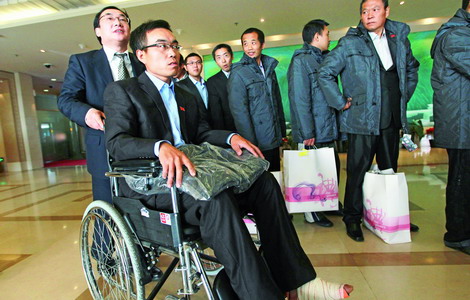 |
|
|
|
|||||||||||
|
 Liu Bingyun arrives at Beijing Capital International Airport on Feb 9 after he and another 28 Chinese workers were rescued from the hands of anti-government rebels in Sudan in late January. Liu's left foot was injured when the group was abducted. [Photo / China Daily] |
When Cambodia was hit by flooding last year, a road that was under construction by Shanghai Construction Group was washed away, costing the company $2 million.
As the project was insured, most of the loss will likely be covered.
However, after several years of dealing with insurance brokers, Li Sen, who works in the company's contracts office, said he knows things are not always so easy.
"It's far more important for companies to strengthen their ability to avoid risks and deal with emergencies," he said, adding that insurance premiums can increase sharply after claims.
As a proactive step, Shanghai Construction Group has drawn up an emergency plan for its overseas operations. In it, managers are encouraged to establish close relationships with Chinese embassy officials and local authorities to ensure warnings and assistance in times of trouble.
The impression given by foreign media is that Chinese enterprises are striking deals around the world to ensure supplies of oil and other raw materials, often in areas passed over by Western companies. Yet, experts say investing in underdeveloped or "dangerous" regions is more down to market conditions.
"We have no choice," Liu Guijin, a special African affairs representative for China, said at a meeting with entrepreneurs in Shanghai in February. "Our companies want to develop in the global market, but mature and stable areas are already occupied by (companies in) developed countries."
Li Sen added: "Most of our projects are in less developed areas. We're not strong enough to compete (in the overseas market) with competitors from the US and Europe."
Shanghai's Dongfang Daily recently reported that, due to the risks, Chinese security firms are setting up offices in places such as Iraq. Embassies are also working hard to provide early warning to companies operating in unstable areas.
As of February, the Ministry of Commerce had issued 20 alerts this year to Chinese companies in West Asia, Africa and Europe.
Chinese workers were targeted twice in Africa in late January. First in Sudan, where anti-government rebels abducted 29 employees of Sinohydro Corp, and then in Egypt, where tribesmen took 25 more hostage.
In both cases, the victims were freed with help from local armed forces. However, one of the workers was killed during the rescue mission in Sudan's South Kordofan state.
"They (the workers who survived) were lucky, as China has good relationships with Sudan and Egypt," Zang said. "What can we do if similar things happen in countries that are less friendly to China?"
Huang Zhiling in Chengdu contributed to this story.
You may contact the writer through [email protected]


